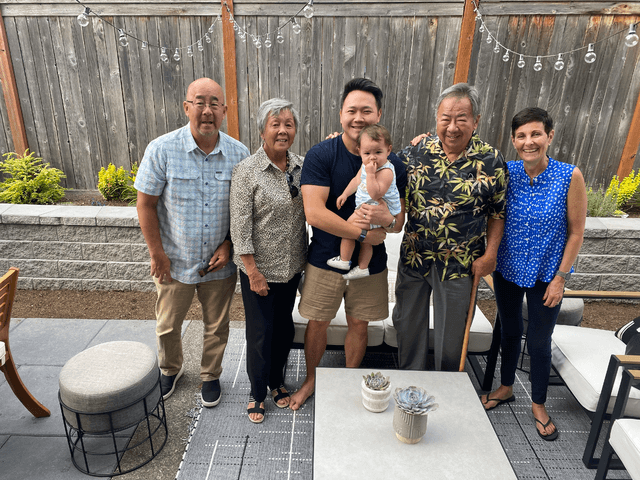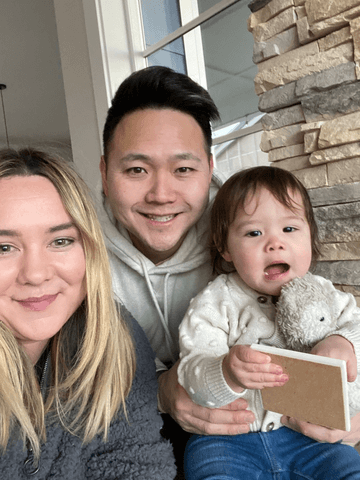
Belong
Aaron, Product Manager: On connecting different world
May is Asian American Pacific Islander Heritage Month – a month in which we celebrate the kaleidoscope of cultures within the Asian American and Pacific Islander community. During AAPI month we will be sharing stories from some of our AAPI team members to help people understand our history and culture and learn about ways to give back to the AAPI community. We’re putting together a resource page on how to get involved in your local community and will be sharing stories from some of our AAPI team. Discover Aaron's story.
What aspects of your ethnicity/culture do you wish more people knew?
Being adopted (born in Seoul), and having a multi-ethnic/cultural background (Korean/Chinese), I wish people could understand how diverse AAPIHM cultures are from one another! I'd challenge folks this month to learn more about the unique differences between the many ethnicities and cultures that make up the broader AAPIHM community.
What about your ethnicity/culture brings you the most pride?
Within the past few years, I've loved seeing the influence that South Korea has had on US culture. From food to films, I'm seeing a lot more representation of South Korean folks across the board which helps more and more people learn about and celebrate the culture!
What cultural celebrations or traditions do you enjoy?
Growing up in a Chinese family, the Lunar New Year was always a big deal. I have fond memories of all the meals and opening Lai See (red envelopes) from my grandparents and family members. On the Korean side, we celebrated my daughter's Baek-il (100 day celebration) with gifts from my half-brother and biological mother!

What is a food that is unique to your ethnicity/culture and what do you love most about it?
On my Chinese side, I've always loved Dim Sum, specifically siu mai (pork/shrimp dumplings). When I eat them now, I'm reminded of all the fun meals I've had over the years with my family, and my great-grandma, grandma, and aunties piling a bunch of these onto my plate! On my Korean side, I'd have to say Kimchi is the most distinctive (and polarizing) food that I love. I love the mix of spiciness with the vinegar/pickled flavor. My favorite way to eat it is mixed in a big bi-bim-bop bowl.
What is the significance or unique story behind your name?
Each part of my name represents different parts of my ethnic/cultural background! My last name, Bowen, is actually not a Chinese one. The first person on the Chinese side of my family to immigrate to the US, Lee Bo-Wen, was given a more "American" sounding name after he arrived - Lee Bowen. In many eastern Asian cultures, the surname is listed first, so really my last name should be Lee. One of my middle names, Arthur, believe it or not, is a family name on my Chinese side. I have no idea how or why my family chose that for all of the men but I like it because it demonstrates how my Chinese family has adopted and integrated with American culture. My second middle name, Hyun, is actually the middle name I was given by my Birth Mother. My full Korean is Kyun Hyun Kim, and my parents wanted to honor my birth mother by keeping Hyun as my middle name.
How has being a Korean and Chinese individual shaped your experience growing up in the United States?
I grew up in a predominantly Caucasian community. Like most people in their early years - I wanted to fit in with my friends, so I mostly rejected my cultural heritage. I thought hearing things like, "You're not like, super Asian" was a good thing. Looking back, I realize now that I had to be hyper-aware of how I was being perceived, which meant I had to really focus on how other people acted and felt around me. I didn't want to seem "too Asian" or different than my friends. Obviously, I was wrong for thinking that way, but this hyper-awareness and want/need to understand how others are feeling has actually helped me quite a bit in my career as a Product Manager. As PMs, we need to truly understand the thoughts, feelings, and motivations of the users we are building for. So while I wish I would have had more pride in my differences growing up, I am grateful for the experience since it has helped guide me to a career that I quite enjoy.
Are there aspects of your cultural background that drive how you identify yourself?
All of them! I am a proud Chinese/Korean American. I am continuously trying to educate myself on all aspects of my cultural identity so that I can share and educate my daughter on her wonderfully complex cultural background.
What challenges have you had to overcome as an AAPI individual?
Probably the most consistent challenge I have is whether or not to speak up when non-AAPI people either knowingly or unknowingly say something offensive to me in casual conversation. It happens far less nowadays, but growing up, Asian jokes were very common among friends and even some managers/co-workers (not at Qualtrics though!). On one hand, you don't want to be seen as the "victimized minority," on the other hand, you want to make sure that person understands that what they are saying is not OK. Professionally, there have been times when I've been coached on "being more assertive," which, if you know me, is kind of funny because I am quite transparent and forthright in a business context.
How has being a part of the AAPI community at Qualtrics positively impacted you?
It's such a supportive and strong group of leaders. For the longest time, I felt like my background set me apart from others, and that I wouldn't be able to relate to AAPI people from more "traditional" backgrounds. What I've learned is that there are almost universal experiences AAPI people have in the US, the primary one being that we all feel caught between different worlds. Hearing that, and vocalizing that in our small groups and discussions has been incredibly reaffirming for me.